几种时态的标志词
- 格式:docx
- 大小:18.65 KB
- 文档页数:2
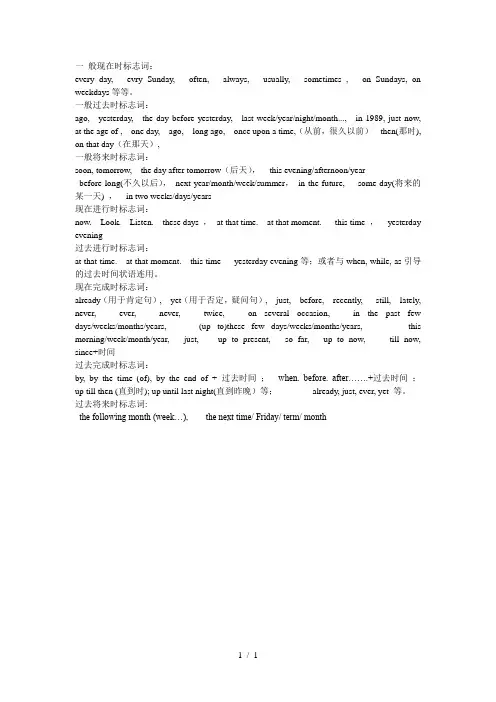
一般现在时标志词:every day, evry Sunday, often, always, usually, sometimes , on Sundays, on weekdays等等。
一般过去时标志词:ago, yesterday, the day before yesterday, last week/year/night/month..., in 1989, just now, at the age of , one day, ago, long ago, once upon a time,(从前,很久以前)then(那时), on that day(在那天),一般将来时标志词:soon, tomorrow, the day after tomorrow(后天),this evening/afternoon/yearbefore long(不久以后),next year/month/week/summer,in the future, some day(将来的某一天) ,in two weeks/days/years现在进行时标志词:now. Look. Listen. these days ,at that time. at that moment. this time ,yesterday evening过去进行时标志词:at that time. at that moment. this time yesterday evening等;或者与when, while, as引导的过去时间状语连用。
现在完成时标志词:already(用于肯定句), yet(用于否定,疑问句), just, before, recently, still, lately, never, ever, never, twice, on several occasion, in the past few days/weeks/months/years, (up to)these few days/weeks/months/years, this morning/week/month/year, just, up to present, so far, up to now, till now, since+时间过去完成时标志词:by, by the time (of), by the end of + 过去时间;when. before. after…….+过去时间;up till then (直到时); up until last night(直到昨晚)等;already, just, ever, yet 等。
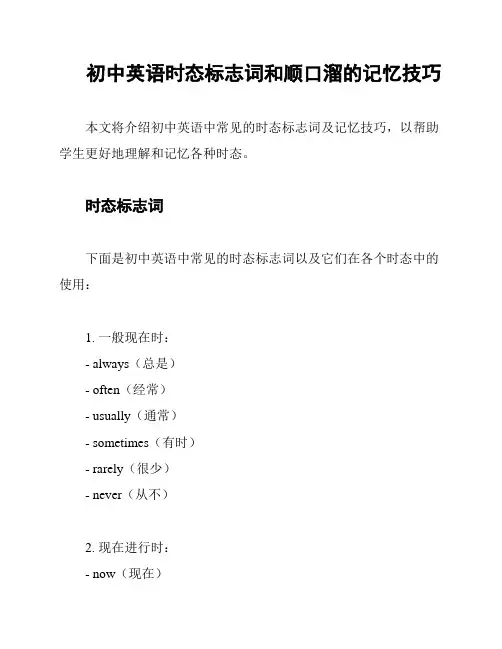
初中英语时态标志词和顺口溜的记忆技巧本文将介绍初中英语中常见的时态标志词及记忆技巧,以帮助学生更好地理解和记忆各种时态。
时态标志词下面是初中英语中常见的时态标志词以及它们在各个时态中的使用:1. 一般现在时:- always(总是)- often(经常)- usually(通常)- sometimes(有时)- rarely(很少)- never(从不)2. 现在进行时:- now(现在)- at the moment(此刻)- currently(目前)- at present(目前)- right now(立刻)3. 一般过去时:- yesterday(昨天)- last week(上周)- in 1999(在1999年)- a few minutes ago(几分钟前)- when I was a child(我小的时候)4. 过去进行时:- at that time(那个时候)- while(当...的时候)- when(当...的时候)- as(当...的时候)- during(在...期间)5. 一般将来时:- tomorrow(明天)- next week(下周)- in the future(将来)- soon(很快)- one day(有一天)6. 将来进行时:- this time tomorrow(明天这个时候)- in a week(一周后)- at this time next year(来年此时)- by the end of next month(到下个月底)记忆技巧记忆时态标志词可以使用以下顺口溜来帮助你:一般现在时要记好,总是often, 通常usually.现在进行时,此刻用,now, at the moment记心头.一般过去时记起来,昨天yesterday, 上周last week.过去进行时多用when,at that time, while来记存.一般将来时记清楚,明天tomorrow, 下周next week.将来进行时用点时刻,this time tomorrow, 一周后in a week.以上是初中英语时态标志词及顺口溜的记忆技巧,希望对你有帮助!。

一般现在时标志词:every day,evry Sunday,often,always,usually,sometimes ,on Sundays,on weekdays等等。
一般过去时标志词:ago,yesterday,the day before yesterday,last week/year/night/month (i)1989,just now,at the age of ,one day,ago,long ago,once upon a time,(从前,很久以前)then(那时),on that day(在那天),一般将来时标志词:soon,tomorrow,the day after tomorrow(后天),this evening/afternoon/yearbefore long(不久以后),next year/month/week/summer,in the future,some day(将来的某一天),in two weeks/days/years现在进行时标志词:now.Look.Listen.these days,at that time.at that moment.this time,yesterday evening过去进行时标志词:at that time.at that moment.this timeyesterday evening等;或者与when, while, as引导的过去时间状语连用。
现在完成时标志词:already(用于肯定句), yet(用于否定,疑问句), just, before, recently,still, lately,never, ever, never, twice, onseveraloccasion,in the past few days/weeks/months/years, (up to)thesefewdays/weeks/months/years, this morning/week/month/year, just,up to present, so far, up to now, till now, since+时间过去完成时标志词:by, by the time (of), by the end of +过去时间;when. before.after…….+过去时间;uptillthen(直到时);upuntillastnight(直到昨晚)等;already, just, ever, yet 等。
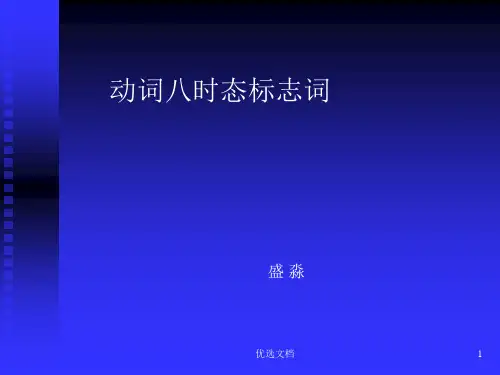
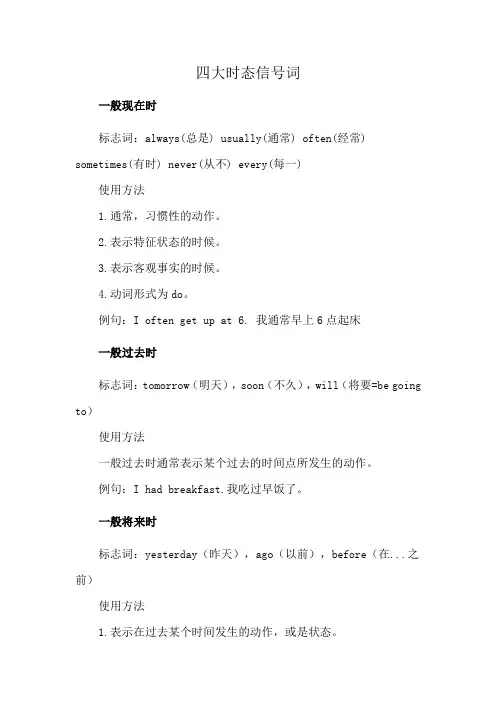
四大时态信号词
一般现在时
标志词:always(总是) usually(通常) often(经常) sometimes(有时) never(从不) every(每一)
使用方法
1.通常,习惯性的动作。
2.表示特征状态的时候。
3.表示客观事实的时候。
4.动词形式为do。
例句:I often get up at 6. 我通常早上6点起床
一般过去时
标志词:tomorrow(明天),soon(不久),will(将要=be going to)
使用方法
一般过去时通常表示某个过去的时间点所发生的动作。
例句:I had breakfast.我吃过早饭了。
一般将来时
标志词:yesterday(昨天),ago(以前),before(在...之前)
使用方法
1.表示在过去某个时间发生的动作,或是状态。
2.过去经常发生的动作和状态。
例句:Li Hua will go to Peking University.李华将会去北大上学。
现在进行时
标志词:now(现在), look(看),listen(听)
使用方法
1.现在正在发生的事情。
2.现阶段正在进行的动作。
例句:I am swimming now. 我正下游泳。
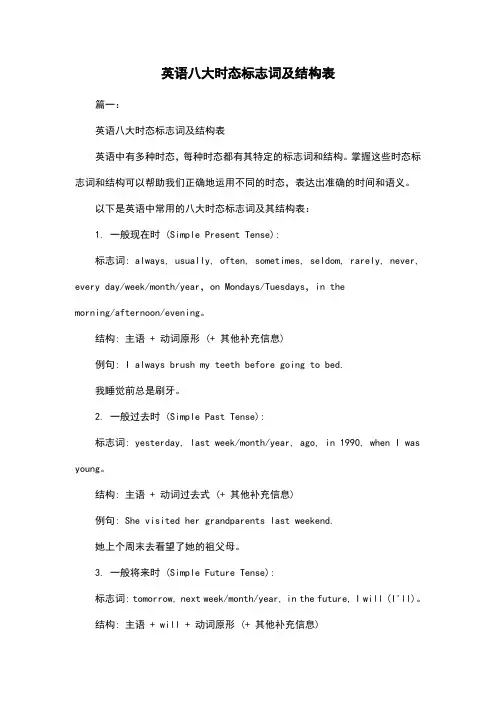
英语八大时态标志词及结构表篇一:英语八大时态标志词及结构表英语中有多种时态,每种时态都有其特定的标志词和结构。
掌握这些时态标志词和结构可以帮助我们正确地运用不同的时态,表达出准确的时间和语义。
以下是英语中常用的八大时态标志词及其结构表:1. 一般现在时 (Simple Present Tense):标志词: always, usually, often, sometimes, seldom, rarely, never, every day/week/month/year,on Mondays/Tuesdays,in themorning/afternoon/evening。
结构: 主语 + 动词原形 (+ 其他补充信息)例句: I always brush my teeth before going to bed.我睡觉前总是刷牙。
2. 一般过去时 (Simple Past Tense):标志词: yesterday, last week/month/year, ago, in 1990, when I was young。
结构: 主语 + 动词过去式 (+ 其他补充信息)例句: She visited her grandparents last weekend.她上个周末去看望了她的祖父母。
3. 一般将来时 (Simple Future Tense):标志词: tomorrow, next week/month/year, in the future, I will (I'll)。
结构: 主语 + will + 动词原形 (+ 其他补充信息)例句: We will go shopping tomorrow.我们明天去购物。
4. 现在进行时 (Present Continuous Tense):标志词: now, at the moment, currently, right now, look!。
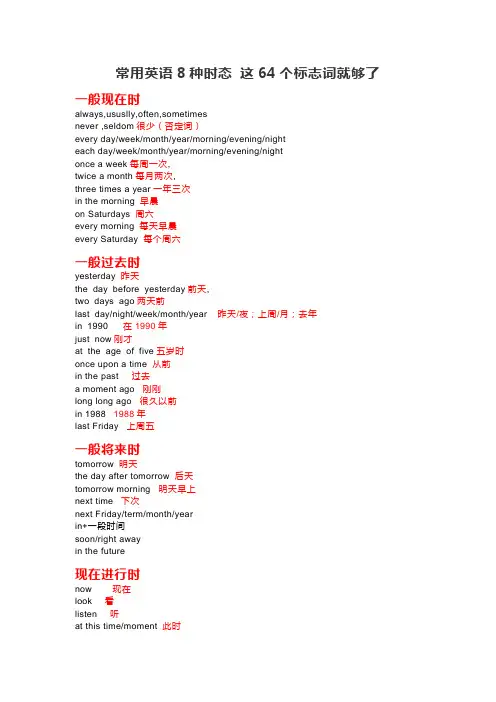
常用英语8种时态这64个标志词就够了一般现在时always,ususlly,often,sometimesnever ,seldom很少(否定词)every day/week/month/year/morning/evening/nighteach day/week/month/year/morning/evening/nightonce a week每周一次,twice a month每月两次,three times a year一年三次in the morning 早晨on Saturdays 周六every morning 每天早晨every Saturday 每个周六一般过去时yesterday昨天the day before yesterday前天,two days ago两天前last day/night/week/month/year 昨天/夜;上周/月;去年in 1990 在1990年just now刚才at the age of five五岁时once upon a time 从前in the past 过去a moment ago 刚刚long long ago 很久以前in 1988 1988年last Friday 上周五一般将来时tomorrow 明天the day after tomorrow 后天tomorrow morning 明天早上next time 下次next Friday/term/month/yearin+一段时间soon/right awayin the future现在进行时now 现在look 看listen 听at this time/moment此时these days 这些天at present 现在现在完成时already/yetjustnevereverfor+一段时间since+时间一点so far/up to now 到目前为止in the past three years 在过去3年里过去完成时by+过去时间点by the timeby thenby the end of last yearbefore+过去时间点up till+过去时间点up till then过去进行时at that timeat that momentyesterday evening过去将来时the following monththe next timethe next fridaythe next term。
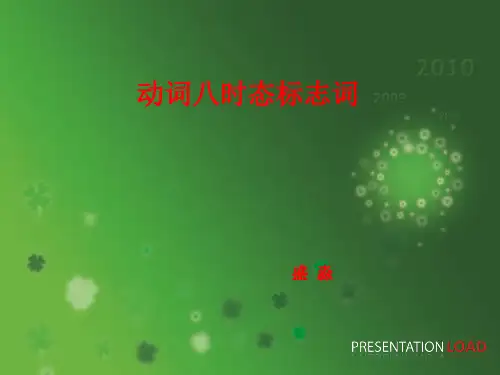
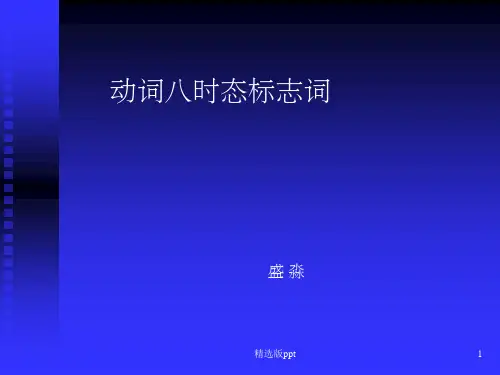
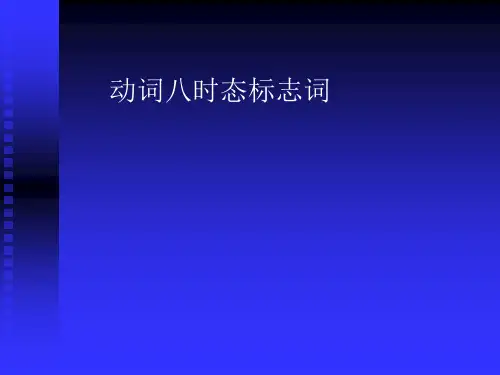
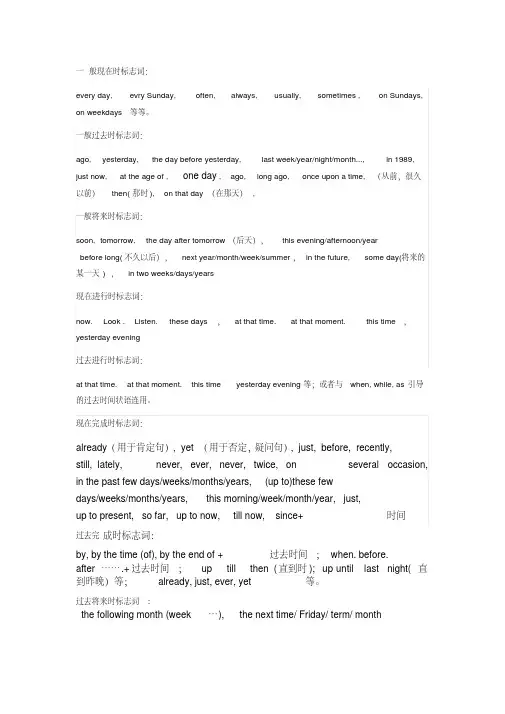
一般现在时标志词:every day, evry Sunday, often, always, usually, sometimes , on Sundays,on weekdays等等。
一般过去时标志词:ago, yesterday, the day before yesterday, last week/year/night/month..., in 1989,just now, at the age of , one day, ago, long ago, once upon a time,(从前,很久以前)then(那时), on that day(在那天),一般将来时标志词:soon, tomorrow, the day after tomorrow(后天),this evening/afternoon/yearbefore long(不久以后),next year/month/week/summer,in the future, some day(将来的某一天) ,in two weeks/days/years现在进行时标志词:now. Look. Listen. these days ,at that time. at that moment. this time ,yesterday evening过去进行时标志词:at that time. at that moment. this time yesterday evening等;或者与when, while, as引导的过去时间状语连用。
现在完成时标志词:already(用于肯定句), yet(用于否定,疑问句), just, before, recently,still, lately, never, ever, never, twice, on several occasion, in the past few days/weeks/months/years, (up to)these fewdays/weeks/months/years, this morning/week/month/year, just,up to present, so far, up to now, till now, since+时间过去完成时标志词:by, by the time (of), by the end of + 过去时间; when. before. after…….+过去时间; up till then (直到时); up until last night(直到昨晚)等; already, just, ever, yet 等。
常见时态标志词常见的时态标志词包括:1. 一般现在时:do/does(被动:is/am/are done),常用于描述现阶段经常发生的动作或存在的状态,如“We go to school at six forty every day.”“My brother reads a book once a week.”2. 现在进行时:am/is/are+doing,常用于描述正在进行的动作,如“Look! He is running now.”3. 一般将来时:will do,常用于描述将要发生的动作或存在的状态,如“I will call you tomorrow.”4. 过去进行时:was/were+doing,常用于描述过去某个时刻正在进行的动作,如“He was playing basketball at 5:00 yesterday afternoon.”5. 现在完成时:have/has+done,常用于描述已经完成的动作或存在的状态,如“I have finished my homework.”6. 过去完成时:had+done,常用于描述过去的某个时刻之前已经完成的动作,如“By the end of last year, they had built many new houses.”7. 过去将来时:would do,常用于描述过去的某个时刻预测未来的动作或状态,如“He said he would go to New York next year.”8. 过去完成进行时:had been doing,常用于描述过去的某个时刻之前一直在进行的动作,如“They had been waiting for the bus for half an hour before it arrived.”这些时态标志词可以帮助我们更好地理解和使用英语中的时态,在不同的语境中表达准确的时间关系和动作状态。
英语八大时态标志词及结构表篇一:英语八大时态标志词及结构表正文:英语中存在八大时态,分别是:过去时、现在时、将来时、过去将来时、现在进行时、将来进行时、过去进行时、现在完成时和未来完成时。
这些时态的不同表达方式和用法,对于英语写作和口语表达都是非常重要的。
本文将介绍这些时态的标志词和结构表,帮助学习者更好地理解和掌握这些时态。
1. 过去时过去时通常用“态”或“ed”表示,表示动作或状态发生在过去。
标志词包括:- was(过去分词):表示动作或状态发生在过去某个时间。
- are(过去分词):表示动作或状态发生在过去。
- was/are(过去分词):表示动作或状态发生在过去的某个时刻。
结构表:| 主语 | 谓语动词 | 时态标志词 || --- | --- | --- || I | I was | was/are || you | you are | are || he/she/it | he/she/it was | was/are || we | we are | are || they | they were | were/are |2. 现在时现在时通常用“态”或“ing”表示,表示动作或状态现在正在进行。
标志词包括:- am/is(现在分词):表示动作或状态现在正在进行。
- are(现在分词):表示动作或状态现在正在进行。
- was/are(现在分词):表示动作或状态现在正在进行。
结构表:| 主语 | 谓语动词 | 时态标志词 || --- | --- | --- || I | I am | am/is || you | you are | are || he/she/it | he/she/it is | is/are || we | we are | are || they | they are | are |3. 将来时将来时通常用“态”或“ing”表示,表示动作或状态将来会发生。
标志词包括:- will(将来分词):表示动作或状态将来会发生。
几种时态的标志词;
一、一般现在时:
always, usually, often, sometimes, every week (day, year, month…), once a week, on Sundays。
二、一般过去时:
ago, yesterday, the day before yesterday, last week(year, night, month…), in 1989, just now, at the age of 5, one day, long long ago, once upon a time, etc.
三、一般将来时:
tomorrow, next day(week, month, year…),soon, in a few minutes, the day after tomorrow, etc.
四、现在进行时:
now, at this time, these days, at present, at the moment,etc.
五、过去进行时:
at this time yesterday, at that time或以when引导的谓语动词是一般过去时的时间状语等。
六、现在完成时:
a.表示说话前发生过一次或多次的动作,现在成为一种经验,一般译为汉语“过”,常带有twice, ever, never, three times等时间状语。
b. 用副词already和yet。
already一般用于肯定句中,yet一般用于否定句和疑问句中。
如:We have already finished our homework.我们已完成作业了。
c.用ever和never。
多用于否定或疑问句中,表示“曾经”或“从未“等。
如:-Have you ever been to the Great Wall?你曾经去过长城吗?
d.用表示到说话为止的过去时间状语,如just, before, up to now, the past few years /so far/in the last few years/until now/by the time等
e.表示从过去某一时刻开始一直持续到现在的动作或状态。
这个动作可能刚停止,可能仍然在进行。
常带有for和since等表示一段时间的状语。
补充现在完成时的标志性词语:still/lately/recently
现在完成时的标志性词组总结:already / ever /never /yet / just / before/ still /lately /since / for a long time /up to now/ until/so far/in the last few years/weeks/mouths / till now/recently/by the time/twice/ever/never/three times/just/before/up to now/the past few years/so far
七、过去完成时:
before, by the end of last year(term, month…),etc.
八、过去将来时:
the next day(morning, year…),the following month(week…),etc.
时态练习题:
用括号内的词的正确形式填空:
1.I _______(walk) to school sometimes.
2. He ___________ (go) to see his grandparents twice a week.
3. Mom ____________ (take) me to the park on Saturday.
4. He __________(leave) here just now.
5. One day, an old man _________ (come) to the village.
6. Once upon a time, the prince ________ (live) happily with the princess.
7.The teacher ______________ (check) the homework soon.
8. The bus _____________(start) in a few seconds.
9. He ________________ (help) with her maths these days.
10. Dad _____________ (talk) on the phone at this time.
选择填空:
()1.He finished his homework yet
(A)doesn’t(B)haven’t(C) hasn’t (D) doesn’t have
( )2.My mother has worked in this factory 2 years.
(A)about (B)for (C)in (D)since
( )3. I haven't heard from him last week.
(A)since (B) for (C)ago (D)before
( )4.His father joined the party_________
(A)for three years (B)since three years ago
(C)three years ago (D)in two years' time
( )5.Mr Green isn't in the office , He to the library
(A)has gone (B)went (C)has been (D)will go ( )6. ——Have you finsheed your homework
——Yes, I it last night
(A)finish (B)finished (C)have finished (D)will finish ( )7.——you ever to Nanjing
——Yes,I there last year.
(A)Have…gone, have gone (B)Have…been , went
(C)Did…go, went (D)Did…go,has , been
( )8.——When you Lucy in New York?
——I here for two years
(A)did…meet,have't seen (B)did…meet,haven't seen
(C)did…meet,don't see (D)would…meet,hadn't seen ( )9. My friend told me that he_________ to Hong Kong the next month.
(A)will go (B)would go (C) goes (D)went。